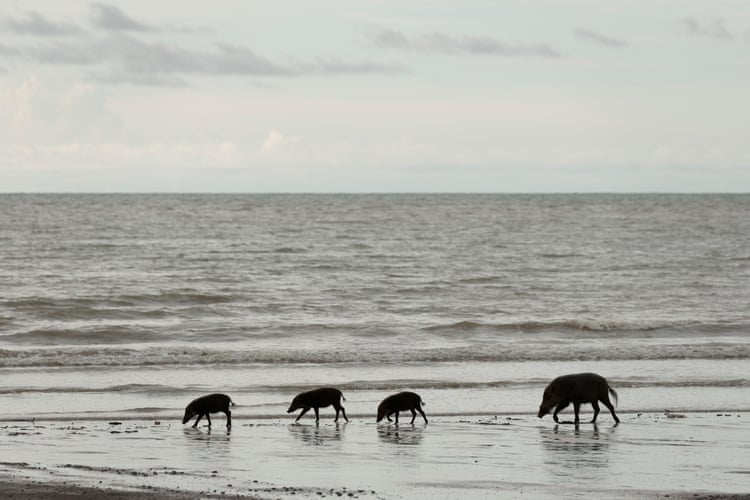Populations of untamed pigs are crashing as a result of unfold of African swine fever (ASF), threatening the livelihoods of thousands and thousands who rely upon them for meals, researchers warn.
With a fatality fee of virtually 100%, ASF has swept throughout Asia, Europe and Africa, devastating home and wild pig populations over the previous 10 to twenty years. The impacts are particularly important in Borneo, in south-east Asia, the place bearded pig numbers have declined by between 90% and 100% because it arrived on the island in 2021, researchers stated.
These pigs have been as soon as the commonest giant mammal species on the island, enjoying an necessary position as ecosystem engineers, dispersing seeds over giant distances, in line with a letter printed within the journal Science. “These pigs have disappeared,” stated Prof Erik Meijaard, the letter’s lead writer and former chair of the IUCN Wild Pigs Specialist Group.
“I’ve gone round to everybody doing digicam trapping in Borneo, and persistently we’re seeing pigs disappearing. They haven’t seen pigs on digicam traps for years,” stated Meijaard. He has additionally monitored seven digicam monitoring programmes in Malaysia, Indonesia and Brunei, which weren’t on the island of Borneo, and located their pig populations plummeted in 2019 and 2020. “As quickly as [ASF] jumps right into a inhabitants it eradicates all the pieces,” he stated.
Meijaard believes the bearded pig might must be relisted from weak to critically endangered on account of ASF. There was no proof that wild pig populations would totally get better in Borneo or different south-east Asian islands resembling Java and Sumatra in Indonesia, Timor-Leste and the Philippines, the scientists stated.
In Borneo, the lack of bearded pigs is already having an unlimited affect on cultures and communities that rely upon them for meals. Native research counsel bearded pigs as soon as accounted for 81% of hunted wildlife by weight in some villages. Now, that quantity is nearer to zero. “It’s a meals safety concern and a poverty concern. Individuals are simply totally depending on entry to wild and feral pigs for his or her protein wants,” stated Meijaard.
The disappearance of this key protein supply places strain on different species: within the absence of pigs, thousands and thousands of native individuals have been prone to shift their focus to looking endangered species resembling pig-tailed macaques, the scientists warned.
The lack of wild pigs can even have an effect on the ecosystem as an entire. Bearded pigs disperse the seeds of timber as they eat fruits and migrate giant distances, defecating them out all through the forest. Additionally they flip over soil with their snouts, which cleans undergrowth and provides tree roots entry to extra soil vitamins. The forests of Borneo are among the many world’s most various ecosystems, however solely 50% stay on account of many years of logging and growth of farmland, notably palm oil plantations.
The scientists known as for pressing analysis and interventions, whereas acknowledging the impacts on communities. The main target needs to be urgently to stop the unfold of ASF to different areas, the letter really useful.
“Though African swine fever has garnered substantial consideration in nations with main pork industries, its results in Borneo have been largely ignored,” researchers wrote. “The lack of pigs disrupts meals safety and ecosystems and threatens different endangered wildlife.”
Trials for creating an efficient vaccine have confirmed constructive outcomes, however this might be simpler for home pigs. Vaccinating wild pigs can be “logistically massively advanced and costly to implement”, stated Prof Benoit Goossens from Cardiff College, one other writer of the letter.
James Wooden, an epidemiologist from the College of Cambridge, who was not concerned within the letter, stated it raised necessary questions in regards to the world narrative of untamed pigs being vectors of illness, and due to this fact a menace to the home pig business. He stated: “The authors describe, in distinction, how wild pig species, which in Borneo and different south-east Asian islands are central to each the tradition and diet of many various peoples, are being devastated by ASF virus, which has been unfold all over the world by human-mediated motion of pigs and pig merchandise.
“All efforts needs to be made to stop the additional unfold of ASF between south-east Asian islands, particularly by commerce in pigs and pig merchandise, as the consequences there may be far worse than simply within the swine business.”
Dr Harriet Bartlett from College of Oxford, who was not concerned within the paper, agreed that the consequences of the illness had been targeted on the pig business. “Increasing our focus past the instant financial considerations to incorporate the broader ecological and societal implications shall be necessary to successfully handle ASF,” she stated.
This text by Phoebe Weston was first printed by The Guardian on 19 January 2024. Lead Picture: A bearded pig on Borneo the place numbers have declined by 90% to 100% since African swine fever arrived on the island in 2021. {Photograph}: John Sullivan/Alamy.
What you are able to do
Assist to save lots of wildlife by donating as little as $1 – It solely takes a minute.

